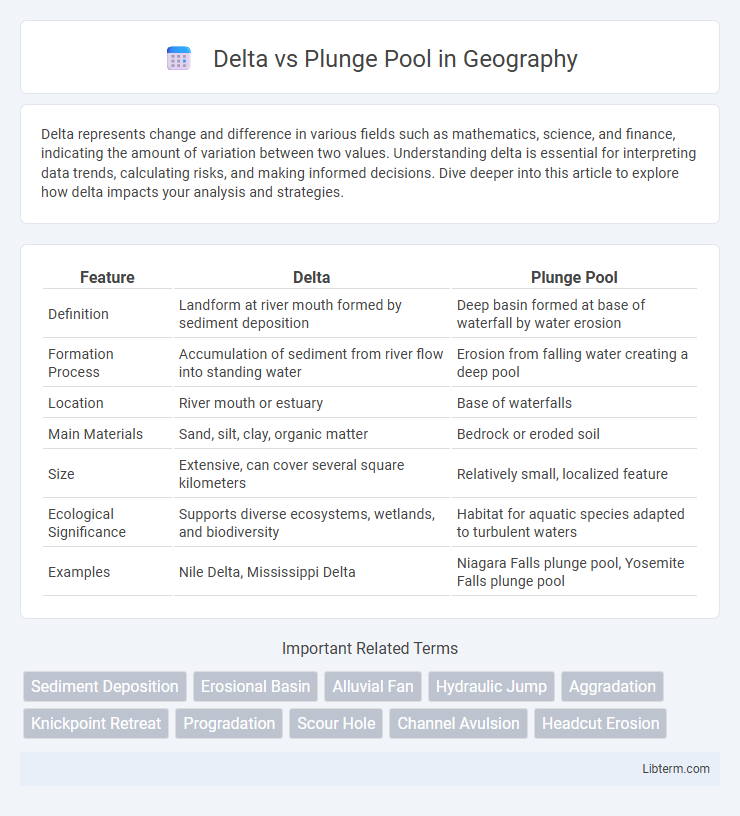Delta represents change and difference in various fields such as mathematics, science, and finance, indicating the amount of variation between two values. Understanding delta is essential for interpreting data trends, calculating risks, and making informed decisions. Dive deeper into this article to explore how delta impacts your analysis and strategies.
Table of Comparison
| Feature | Delta | Plunge Pool |
|---|---|---|
| Definition | Landform at river mouth formed by sediment deposition | Deep basin formed at base of waterfall by water erosion |
| Formation Process | Accumulation of sediment from river flow into standing water | Erosion from falling water creating a deep pool |
| Location | River mouth or estuary | Base of waterfalls |
| Main Materials | Sand, silt, clay, organic matter | Bedrock or eroded soil |
| Size | Extensive, can cover several square kilometers | Relatively small, localized feature |
| Ecological Significance | Supports diverse ecosystems, wetlands, and biodiversity | Habitat for aquatic species adapted to turbulent waters |
| Examples | Nile Delta, Mississippi Delta | Niagara Falls plunge pool, Yosemite Falls plunge pool |
Introduction to Delta and Plunge Pools
Delta formations occur where rivers deposit sediment upon entering slower-moving or standing water, creating fan-shaped landforms rich in diverse ecosystems. Plunge pools are deep, bowl-shaped depressions formed at the base of waterfalls due to the erosive force of falling water impacting the riverbed. Both features represent dynamic fluvial processes, with deltas primarily involving sediment accumulation and plunge pools emphasizing erosional activity.
Key Differences Between Delta and Plunge Pools
Delta and plunge pools differ primarily in their formation processes and environmental contexts; delta pools form at river mouths where sediment deposits create a fan-shaped landform, while plunge pools are deep basins carved by the erosive force of falling water at waterfalls. The sediment accumulation in delta pools contrasts sharply with the high-energy erosion defining plunge pools, influencing their shape and ecological characteristics. Delta pools are generally shallow with rich biodiversity due to nutrient deposits, whereas plunge pools are deeper with turbulent waters, supporting specialized aquatic life adapted to dynamic conditions.
Design and Structure Comparison
Delta pools feature a naturalistic design with gradual slopes and irregular shapes that mimic river deltas, promoting seamless water flow and aesthetic integration with landscapes. Plunge pools prioritize compact, deep structures suited for aquatic exercise and relaxation, typically with uniform depth and minimal entry slopes to optimize space and water containment. Both designs serve distinct functional and visual purposes, with delta pools emphasizing organic water movement and plunge pools focusing on efficient, concentrated use.
Installation Requirements and Processes
Delta systems typically require straightforward installation with minimal excavation, often involving surface mounting or light anchoring, making them suitable for quick setups. Plunge pools demand more extensive groundwork, including soil assessment, excavation to precise depths, and often reinforced structural supports to ensure safety and durability. Both installations must consider local regulations, drainage, and access for maintenance, but plunge pools involve higher costs and longer timelines due to complexity.
Space and Size Considerations
Delta pools typically require more space due to their irregular, natural shapes that mimic river deltas, making them ideal for expansive outdoor areas. Plunge pools are compact, designed for small spaces, often fitting into tight urban backyards or limited patios without sacrificing depth or luxury. Choosing between the two depends on available outdoor space and the desired pool footprint, with Delta pools offering broad, shallow areas and Plunge pools maximizing depth in minimal surface area.
Cost Analysis: Delta vs Plunge Pool
The cost analysis between Delta pools and plunge pools reveals that Delta pools typically involve higher construction expenses due to their larger size and more complex design, averaging between $50,000 and $100,000. Plunge pools, being smaller and simpler, generally cost between $20,000 and $50,000, making them a more budget-friendly option for homeowners seeking efficient space utilization. Maintenance costs also favor plunge pools, as their reduced water volume and filtration requirements translate into lower ongoing expenses compared to the more resource-intensive Delta pools.
Maintenance Demands and Longevity
Delta pools require moderate maintenance with regular cleaning and chemical balancing to prevent algae growth, offering a lifespan of approximately 20-25 years with proper care. Plunge pools demand higher maintenance due to their compact size and often complex filtration systems but benefit from durable construction materials that can extend their longevity beyond 30 years. Both pool types benefit from routine inspections, though plunge pools may incur higher upkeep costs due to specialized equipment and water treatment needs.
Aesthetic Appeal and Landscape Integration
Delta pools offer sleek, geometric designs that complement modern landscapes with clean lines and minimalist aesthetics. Plunge pools emphasize naturalistic elements, often incorporating organic shapes and cascading water features that blend seamlessly into garden settings. Both options enhance outdoor spaces, with Delta pools providing a contemporary visual impact and plunge pools creating a tranquil, nature-inspired ambiance.
Ideal Use Cases for Each Pool Type
Delta pools are ideal for residential backyards and small recreational spaces due to their compact design and ease of maintenance, perfect for families seeking a low-cost swimming option. Plunge pools suit urban settings and luxury properties where space constraints exist but users desire deep, refreshing water for quick immersion and relaxation. Both pool types cater to specific needs: Delta pools emphasize multifunctional leisure, while plunge pools prioritize intense, therapeutic water experiences.
Choosing the Right Pool for Your Needs
Choosing the right pool between a delta pool and a plunge pool depends on space, intended use, and budget. Delta pools offer more versatile swimming options and suit larger outdoor areas, while plunge pools excel in compact spaces for relaxation and hydrotherapy. Evaluate your lifestyle, available space, and maintenance preferences to determine which pool aligns best with your needs.
Delta Infographic

 libterm.com
libterm.com